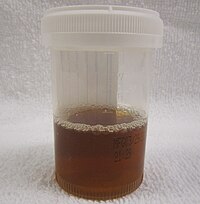
A novel mechanism of autophagy-associated cell death of vasopressin neurons in familial neurohypophysial diabetes insipidus
Sign Up to like & getrecommendations! Published in 2018 at "Cell and Tissue Research"
DOI: 10.1007/s00441-018-2872-4
Abstract: Familial neurohypophysial diabetes insipidus (FNDI), characterized by delayed-onset progressive polyuria and loss of arginine vasopressin (AVP) neuron, is an autosomal dominant disorder caused by AVP gene mutations. We previously generated a knock-in mouse model for… read more here.
Keywords: fndi mice; autophagy associated; avp neurons; familial neurohypophysial ... See more keywords

Hemorrhagic fever with renal syndrome accompanied by panhypopituitarism and central diabetes insipidus: a case report
Sign Up to like & getrecommendations! Published in 2018 at "Journal of NeuroVirology"
DOI: 10.1007/s13365-018-0624-6
Abstract: Central diabetes insipidus (DI) was detected in a patient with hemorrhagic fever with renal syndrome (HFRS) who had been molecularly and serologically diagnosed with Hantaan virus infection. We recommend that clinicians differentiate central DI in… read more here.
Keywords: renal syndrome; hemorrhagic fever; fever renal; central diabetes ... See more keywords

Central diabetes insipidus (Infundibuloneuro hypophysitis): A late complication of COVID-19 infection
Sign Up to like & getrecommendations! Published in 2021 at "Journal of Endocrinological Investigation"
DOI: 10.1007/s40618-021-01627-z
Abstract: A novel coronavirus disease (COVID-19), caused by severe acute respiratory syndrome coronavirus 2 (SARS-CoV-2), has engulfed the world and has affected more than 151 million people, claiming more than 3.1 million lives across 192 countries… read more here.
Keywords: infection; hypophysitis; diabetes insipidus; central diabetes ... See more keywords

A homozygote frameshift mutation in OCLN gene result in Pseudo-TORCH syndrome type I: A case report extending the phenotype with central diabetes insipidus and renal dysfunction.
Sign Up to like & getrecommendations! Published in 2020 at "European journal of medical genetics"
DOI: 10.1016/j.ejmg.2020.103923
Abstract: Intrauterine infections with the pathogens, including toxoplasmosis, other (syphilis, varicella, mumps, parvovirus, and HIV), rubella, cytomegalovirus, and herpes simplex (TORCH) in susceptible individuals during pregnancy, result in microcephaly, white matter disease, cerebral atrophy, and calcifications… read more here.
Keywords: renal dysfunction; ocln gene; central diabetes; torch ... See more keywords

A case of central diabetes insipidus after ketamine infusion during an external to internal carotid artery bypass.
Sign Up to like & getrecommendations! Published in 2017 at "Journal of clinical anesthesia"
DOI: 10.1016/j.jclinane.2016.09.024
Abstract: STUDY OBJECTIVE We report the first teenage case of ketamine-induced transient central diabetes insipidus. CASE SUMMARY The patient was an 18-year-old woman with moyamoya disease undergoing an external carotid to internal carotid bypass and given… read more here.
Keywords: ketamine infusion; urine output; infusion; case ... See more keywords

RNA-Seq and protein mass spectrometry in microdissected kidney tubules reveal signaling processes initiating lithium-induced nephrogenic diabetes insipidus.
Sign Up to like & getrecommendations! Published in 2019 at "Kidney international"
DOI: 10.1016/j.kint.2019.02.015
Abstract: Lithium salts, used for treating bipolar disorder, frequently induce nephrogenic diabetes insipidus (NDI) thereby limiting therapeutic success. NDI is associated with loss of expression of the gene coding for the molecular water channel, aquaporin-2, in… read more here.
Keywords: nephrogenic diabetes; lithium induced; diabetes insipidus; rna seq ... See more keywords

Role of protein aggregation and degradation in autosomal dominant neurohypophyseal diabetes insipidus
Sign Up to like & getrecommendations! Published in 2020 at "Molecular and Cellular Endocrinology"
DOI: 10.1016/j.mce.2019.110653
Abstract: This review focuses on the cellular and molecular aspects underlying familial neurohypophyseal diabetes insipidus (DI), a rare disorder that is usually transmitted in an autosomal-dominant fashion. The disease, manifesting in infancy or early childhood and… read more here.
Keywords: aggregation; dominant neurohypophyseal; neurohypophyseal; autosomal dominant ... See more keywords

Bilateral Ossified Chronic Subdural Hematoma Presenting as Diabetes Insipidus-Case Report and Literature Review.
Sign Up to like & getrecommendations! Published in 2017 at "World neurosurgery"
DOI: 10.1016/j.wneu.2016.11.031
Abstract: Calcified chronic subdural hematomas are an occurrence rarely seen in neurosurgical clinical practice. And when they occur bilaterally, the radiologic image they present is fascinating, as is the clinical presentation, but their management may be… read more here.
Keywords: ossified chronic; chronic subdural; hematoma presenting; subdural hematoma ... See more keywords

Hyperactivation of Nrf2 in early tubular development induces nephrogenic diabetes insipidus
Sign Up to like & getrecommendations! Published in 2017 at "Nature Communications"
DOI: 10.1038/ncomms14577
Abstract: NF-E2-related factor-2 (Nrf2) regulates cellular responses to oxidative and electrophilic stress. Loss of Keap1 increases Nrf2 protein levels, and Keap1-null mice die of oesophageal hyperkeratosis because of Nrf2 hyperactivation. Here we show that deletion of… read more here.
Keywords: null mice; hyperactivation; keap1 null; nephrogenic diabetes ... See more keywords

Dynamics and energetics of water transport through aquaporin mutants causing nephrogenic diabetes insipidus (NDI): A molecular dynamics study
Sign Up to like & getrecommendations! Published in 2020 at "Journal of Biomolecular Structure and Dynamics"
DOI: 10.1080/07391102.2020.1824813
Abstract: Abstract Human aquaporin-2 (AQP2) is the principal water channel in the human kidney. Any alteration of its physiological functioning may lead to the water imbalance and consequently diseases in humans, especially nephrogenic diabetes insipidus (NDI).… read more here.
Keywords: aquaporin; diabetes insipidus; water; insipidus ndi ... See more keywords

Central Diabetes Insipidus in an Infant with Pneumococcal Meningitis
Sign Up to like & getrecommendations! Published in 2019 at "Fetal and Pediatric Pathology"
DOI: 10.1080/15513815.2018.1547335
Abstract: Abstract Background: Central diabetes is an infrequent complication reported in the neonatal period. Case report: CDI as a complication of Streptococcus pneumoniae (S. pneumoniae) sepsis and meningitis in a 9-day-old boy is presented. The CDI… read more here.
Keywords: meningitis; cdi; insipidus infant; central diabetes ... See more keywords